Organisational Behaviour: Culture, Motivation in Sainsbury's
VerifiedAdded on 2023/06/18
|18
|5161
|350
Report
AI Summary
This report provides an analysis of organisational behaviour, focusing on Sainsbury's as a case study. It examines the influence of organisational culture, politics, and power on individual and team performance, exploring different types of organisational cultures and Hofstede's cultural dimensions. The report also discusses content and process theories of motivation, particularly Maslow's hierarchy of needs, and their impact on achieving company goals. Furthermore, it touches upon the factors that contribute to effective teamwork and various philosophies and concepts within organisational behaviour. This document, contributed by a student, is available on Desklib, offering valuable insights and study resources for students.
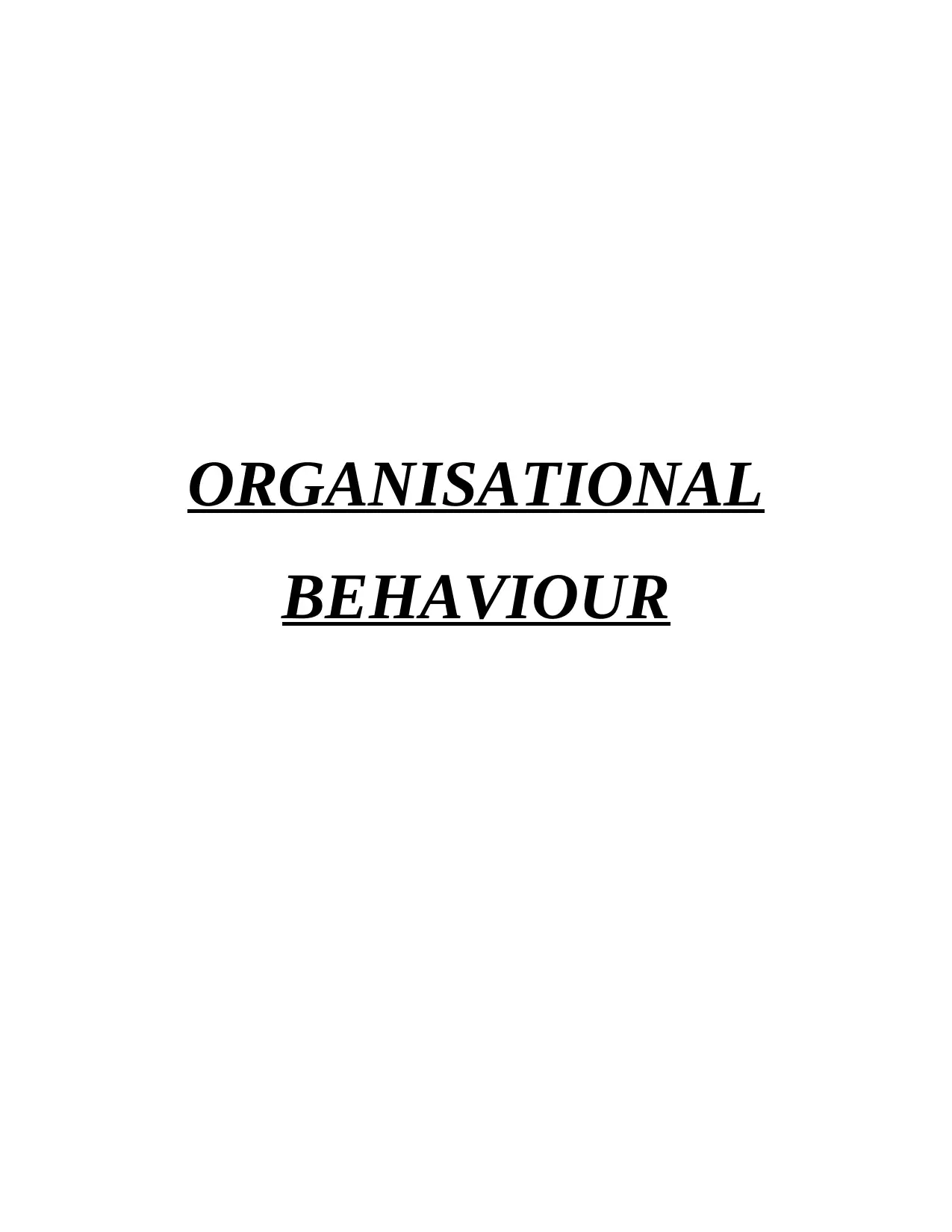
ORGANISATIONAL
BEHAVIOUR
BEHAVIOUR
Paraphrase This Document
Need a fresh take? Get an instant paraphrase of this document with our AI Paraphraser
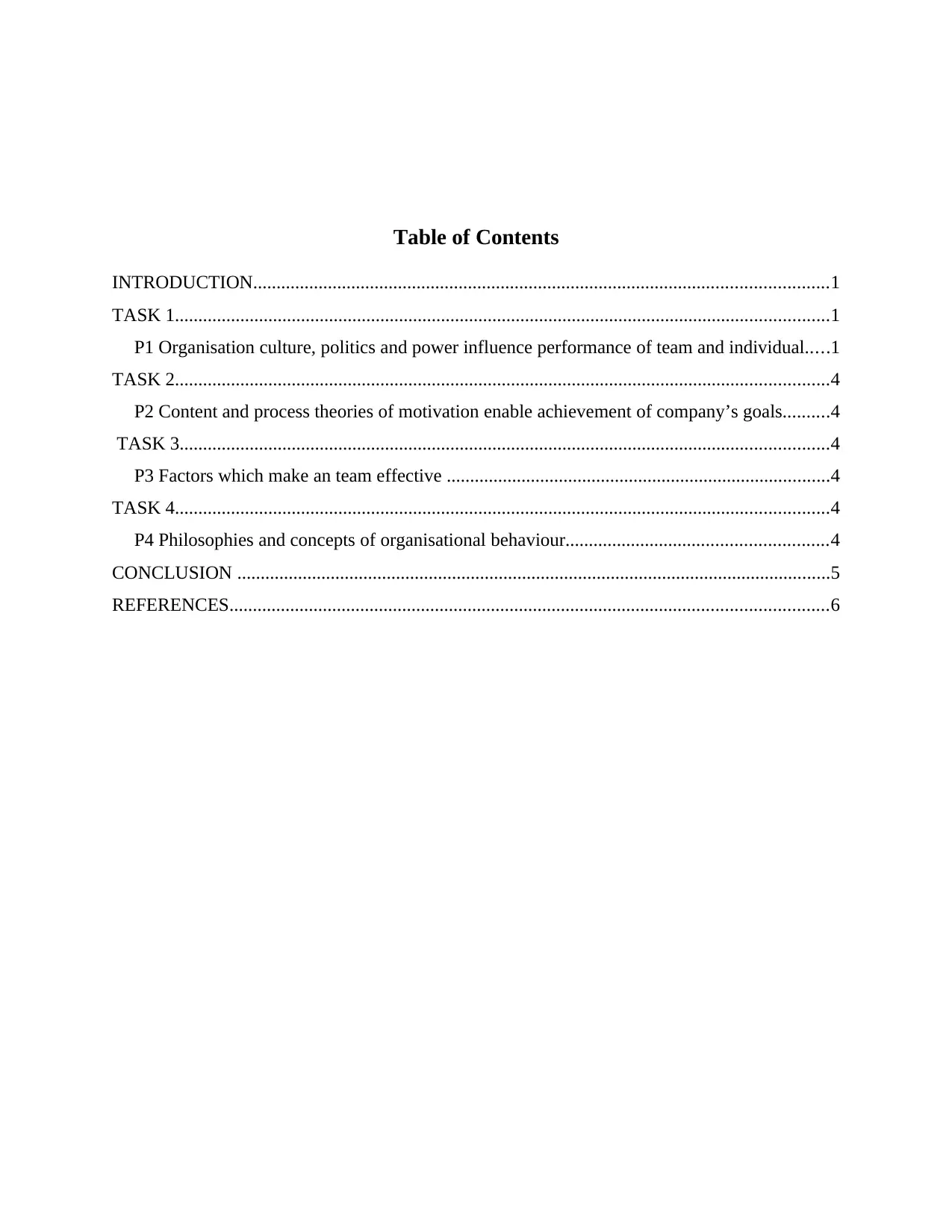
Table of Contents
INTRODUCTION...........................................................................................................................1
TASK 1............................................................................................................................................1
P1 Organisation culture, politics and power influence performance of team and individual.....1
TASK 2............................................................................................................................................4
P2 Content and process theories of motivation enable achievement of company’s goals..........4
TASK 3...........................................................................................................................................4
P3 Factors which make an team effective ..................................................................................4
TASK 4............................................................................................................................................4
P4 Philosophies and concepts of organisational behaviour........................................................4
CONCLUSION ...............................................................................................................................5
REFERENCES................................................................................................................................6
INTRODUCTION...........................................................................................................................1
TASK 1............................................................................................................................................1
P1 Organisation culture, politics and power influence performance of team and individual.....1
TASK 2............................................................................................................................................4
P2 Content and process theories of motivation enable achievement of company’s goals..........4
TASK 3...........................................................................................................................................4
P3 Factors which make an team effective ..................................................................................4
TASK 4............................................................................................................................................4
P4 Philosophies and concepts of organisational behaviour........................................................4
CONCLUSION ...............................................................................................................................5
REFERENCES................................................................................................................................6
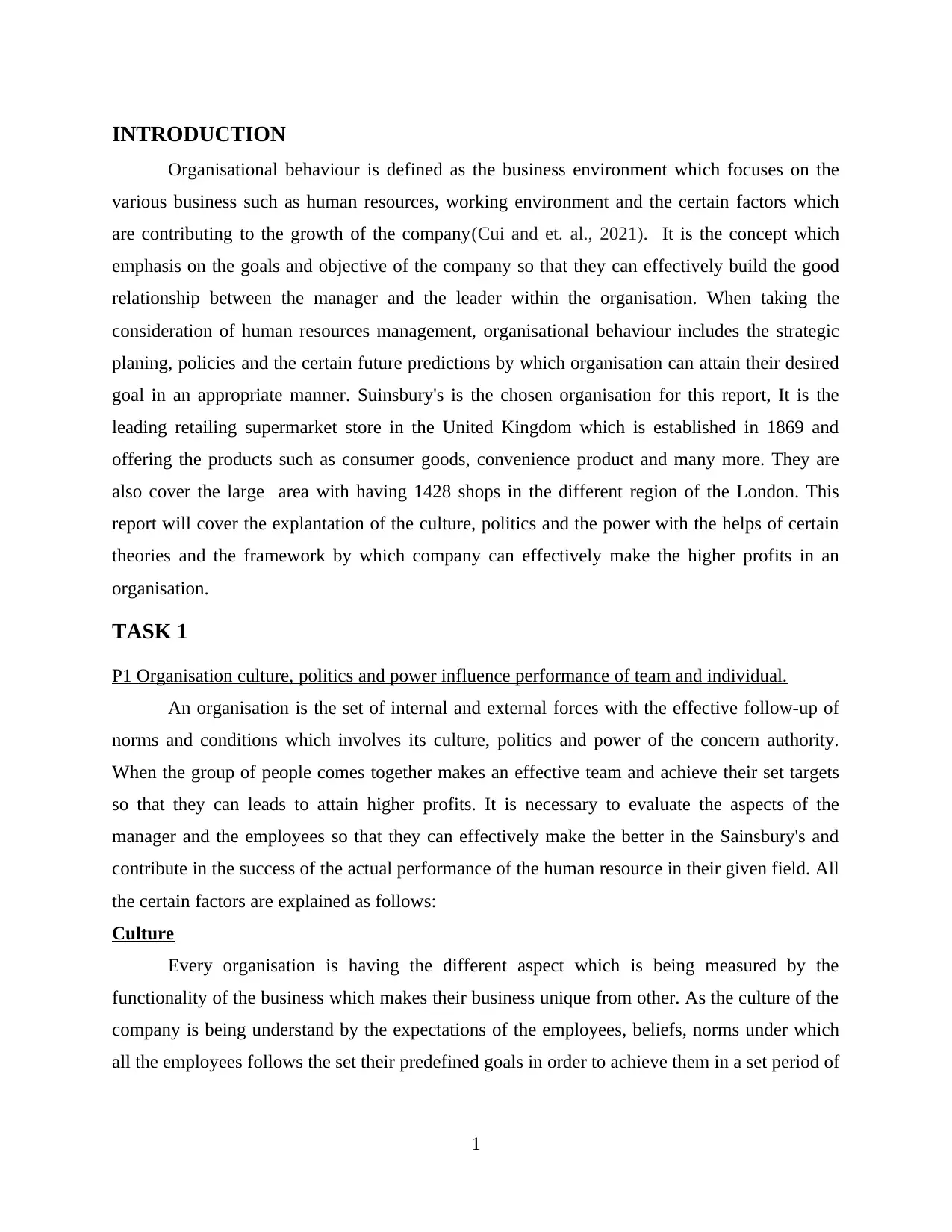
INTRODUCTION
Organisational behaviour is defined as the business environment which focuses on the
various business such as human resources, working environment and the certain factors which
are contributing to the growth of the company(Cui and et. al., 2021). It is the concept which
emphasis on the goals and objective of the company so that they can effectively build the good
relationship between the manager and the leader within the organisation. When taking the
consideration of human resources management, organisational behaviour includes the strategic
planing, policies and the certain future predictions by which organisation can attain their desired
goal in an appropriate manner. Suinsbury's is the chosen organisation for this report, It is the
leading retailing supermarket store in the United Kingdom which is established in 1869 and
offering the products such as consumer goods, convenience product and many more. They are
also cover the large area with having 1428 shops in the different region of the London. This
report will cover the explantation of the culture, politics and the power with the helps of certain
theories and the framework by which company can effectively make the higher profits in an
organisation.
TASK 1
P1 Organisation culture, politics and power influence performance of team and individual.
An organisation is the set of internal and external forces with the effective follow-up of
norms and conditions which involves its culture, politics and power of the concern authority.
When the group of people comes together makes an effective team and achieve their set targets
so that they can leads to attain higher profits. It is necessary to evaluate the aspects of the
manager and the employees so that they can effectively make the better in the Sainsbury's and
contribute in the success of the actual performance of the human resource in their given field. All
the certain factors are explained as follows:
Culture
Every organisation is having the different aspect which is being measured by the
functionality of the business which makes their business unique from other. As the culture of the
company is being understand by the expectations of the employees, beliefs, norms under which
all the employees follows the set their predefined goals in order to achieve them in a set period of
1
Organisational behaviour is defined as the business environment which focuses on the
various business such as human resources, working environment and the certain factors which
are contributing to the growth of the company(Cui and et. al., 2021). It is the concept which
emphasis on the goals and objective of the company so that they can effectively build the good
relationship between the manager and the leader within the organisation. When taking the
consideration of human resources management, organisational behaviour includes the strategic
planing, policies and the certain future predictions by which organisation can attain their desired
goal in an appropriate manner. Suinsbury's is the chosen organisation for this report, It is the
leading retailing supermarket store in the United Kingdom which is established in 1869 and
offering the products such as consumer goods, convenience product and many more. They are
also cover the large area with having 1428 shops in the different region of the London. This
report will cover the explantation of the culture, politics and the power with the helps of certain
theories and the framework by which company can effectively make the higher profits in an
organisation.
TASK 1
P1 Organisation culture, politics and power influence performance of team and individual.
An organisation is the set of internal and external forces with the effective follow-up of
norms and conditions which involves its culture, politics and power of the concern authority.
When the group of people comes together makes an effective team and achieve their set targets
so that they can leads to attain higher profits. It is necessary to evaluate the aspects of the
manager and the employees so that they can effectively make the better in the Sainsbury's and
contribute in the success of the actual performance of the human resource in their given field. All
the certain factors are explained as follows:
Culture
Every organisation is having the different aspect which is being measured by the
functionality of the business which makes their business unique from other. As the culture of the
company is being understand by the expectations of the employees, beliefs, norms under which
all the employees follows the set their predefined goals in order to achieve them in a set period of
1
⊘ This is a preview!⊘
Do you want full access?
Subscribe today to unlock all pages.

Trusted by 1+ million students worldwide
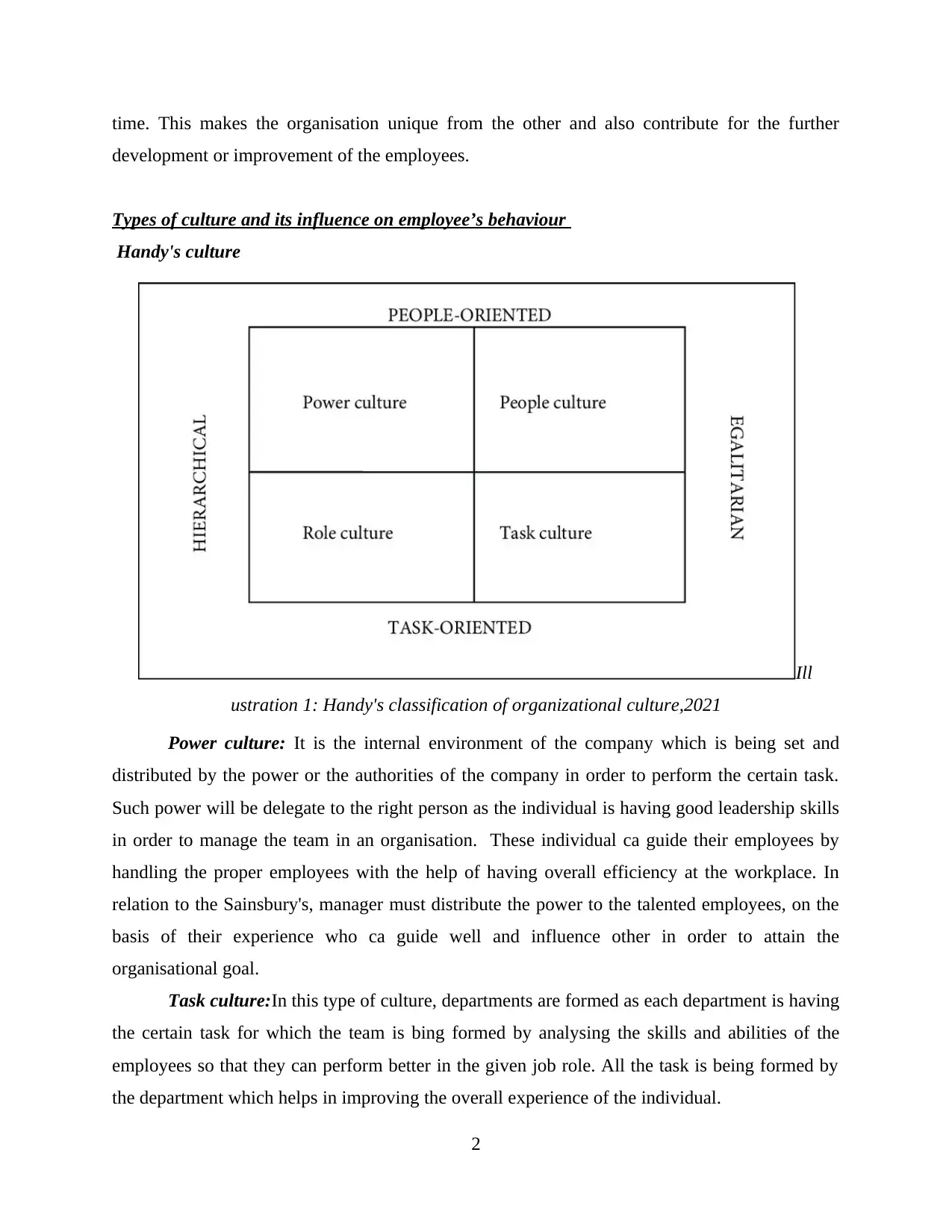
time. This makes the organisation unique from the other and also contribute for the further
development or improvement of the employees.
Types of culture and its influence on employee’s behaviour
Handy's culture
Ill
ustration 1: Handy's classification of organizational culture,2021
Power culture: It is the internal environment of the company which is being set and
distributed by the power or the authorities of the company in order to perform the certain task.
Such power will be delegate to the right person as the individual is having good leadership skills
in order to manage the team in an organisation. These individual ca guide their employees by
handling the proper employees with the help of having overall efficiency at the workplace. In
relation to the Sainsbury's, manager must distribute the power to the talented employees, on the
basis of their experience who ca guide well and influence other in order to attain the
organisational goal.
Task culture:In this type of culture, departments are formed as each department is having
the certain task for which the team is bing formed by analysing the skills and abilities of the
employees so that they can perform better in the given job role. All the task is being formed by
the department which helps in improving the overall experience of the individual.
2
development or improvement of the employees.
Types of culture and its influence on employee’s behaviour
Handy's culture
Ill
ustration 1: Handy's classification of organizational culture,2021
Power culture: It is the internal environment of the company which is being set and
distributed by the power or the authorities of the company in order to perform the certain task.
Such power will be delegate to the right person as the individual is having good leadership skills
in order to manage the team in an organisation. These individual ca guide their employees by
handling the proper employees with the help of having overall efficiency at the workplace. In
relation to the Sainsbury's, manager must distribute the power to the talented employees, on the
basis of their experience who ca guide well and influence other in order to attain the
organisational goal.
Task culture:In this type of culture, departments are formed as each department is having
the certain task for which the team is bing formed by analysing the skills and abilities of the
employees so that they can perform better in the given job role. All the task is being formed by
the department which helps in improving the overall experience of the individual.
2
Paraphrase This Document
Need a fresh take? Get an instant paraphrase of this document with our AI Paraphraser
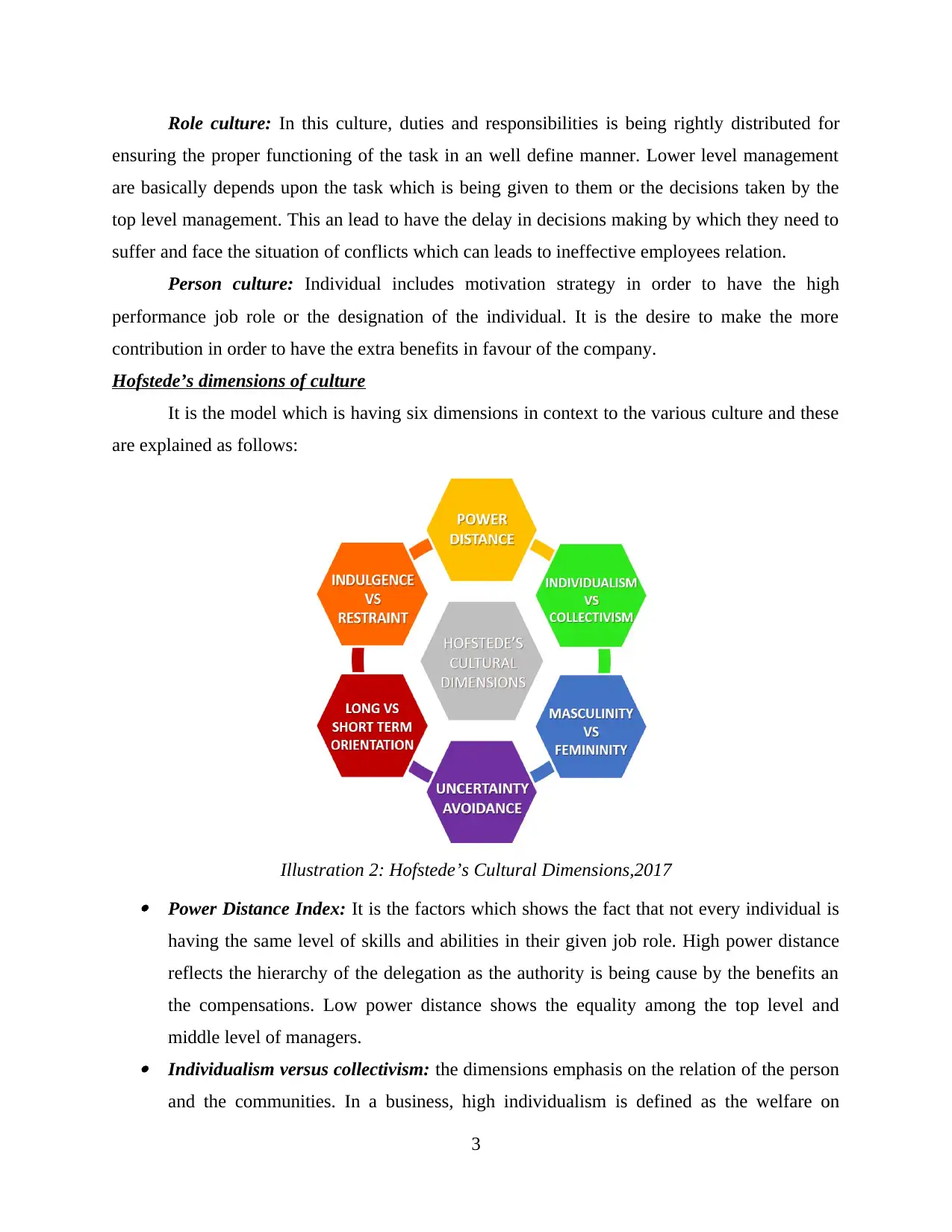
Role culture: In this culture, duties and responsibilities is being rightly distributed for
ensuring the proper functioning of the task in an well define manner. Lower level management
are basically depends upon the task which is being given to them or the decisions taken by the
top level management. This an lead to have the delay in decisions making by which they need to
suffer and face the situation of conflicts which can leads to ineffective employees relation.
Person culture: Individual includes motivation strategy in order to have the high
performance job role or the designation of the individual. It is the desire to make the more
contribution in order to have the extra benefits in favour of the company.
Hofstede’s dimensions of culture
It is the model which is having six dimensions in context to the various culture and these
are explained as follows:
Illustration 2: Hofstede’s Cultural Dimensions,2017 Power Distance Index: It is the factors which shows the fact that not every individual is
having the same level of skills and abilities in their given job role. High power distance
reflects the hierarchy of the delegation as the authority is being cause by the benefits an
the compensations. Low power distance shows the equality among the top level and
middle level of managers. Individualism versus collectivism: the dimensions emphasis on the relation of the person
and the communities. In a business, high individualism is defined as the welfare on
3
ensuring the proper functioning of the task in an well define manner. Lower level management
are basically depends upon the task which is being given to them or the decisions taken by the
top level management. This an lead to have the delay in decisions making by which they need to
suffer and face the situation of conflicts which can leads to ineffective employees relation.
Person culture: Individual includes motivation strategy in order to have the high
performance job role or the designation of the individual. It is the desire to make the more
contribution in order to have the extra benefits in favour of the company.
Hofstede’s dimensions of culture
It is the model which is having six dimensions in context to the various culture and these
are explained as follows:
Illustration 2: Hofstede’s Cultural Dimensions,2017 Power Distance Index: It is the factors which shows the fact that not every individual is
having the same level of skills and abilities in their given job role. High power distance
reflects the hierarchy of the delegation as the authority is being cause by the benefits an
the compensations. Low power distance shows the equality among the top level and
middle level of managers. Individualism versus collectivism: the dimensions emphasis on the relation of the person
and the communities. In a business, high individualism is defined as the welfare on
3
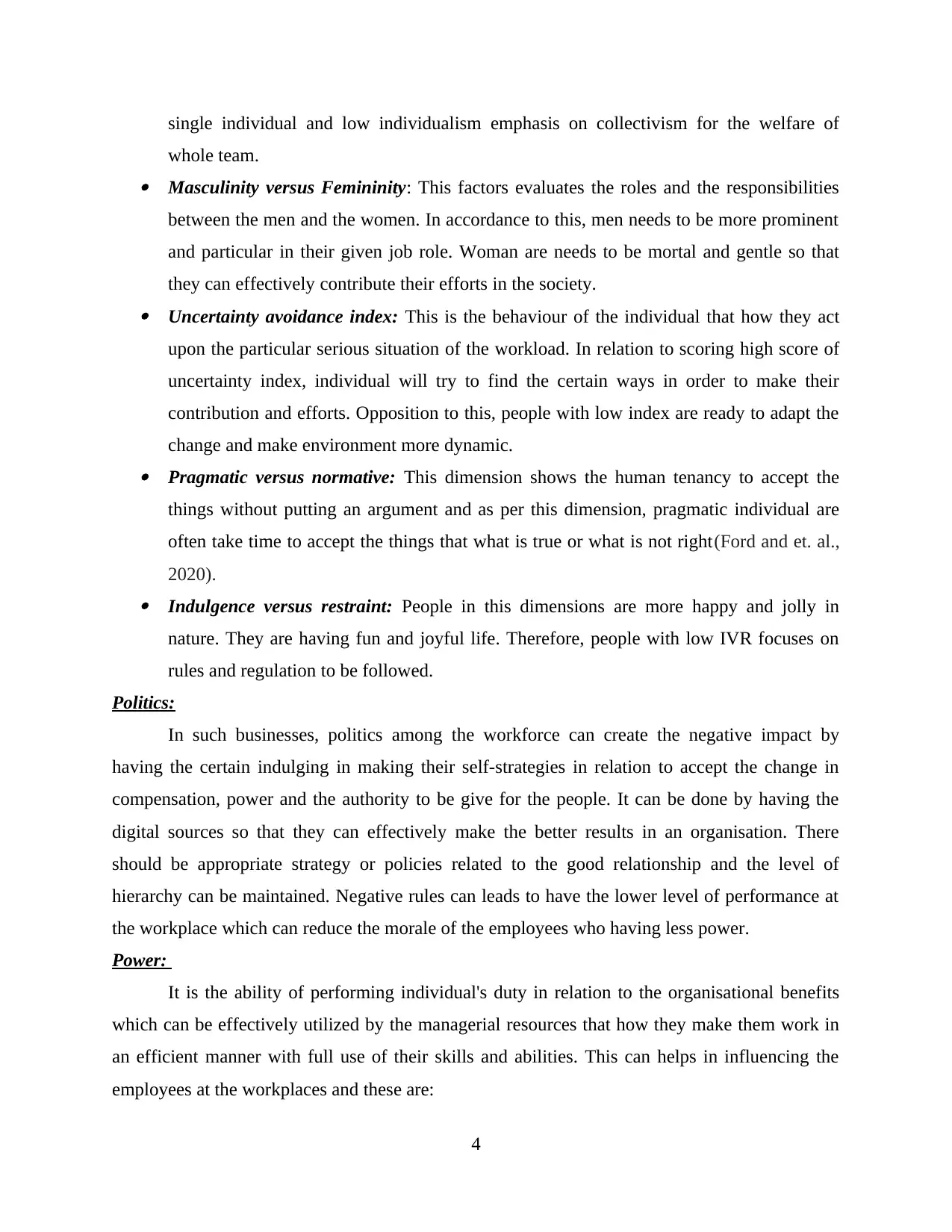
single individual and low individualism emphasis on collectivism for the welfare of
whole team. Masculinity versus Femininity: This factors evaluates the roles and the responsibilities
between the men and the women. In accordance to this, men needs to be more prominent
and particular in their given job role. Woman are needs to be mortal and gentle so that
they can effectively contribute their efforts in the society. Uncertainty avoidance index: This is the behaviour of the individual that how they act
upon the particular serious situation of the workload. In relation to scoring high score of
uncertainty index, individual will try to find the certain ways in order to make their
contribution and efforts. Opposition to this, people with low index are ready to adapt the
change and make environment more dynamic. Pragmatic versus normative: This dimension shows the human tenancy to accept the
things without putting an argument and as per this dimension, pragmatic individual are
often take time to accept the things that what is true or what is not right(Ford and et. al.,
2020). Indulgence versus restraint: People in this dimensions are more happy and jolly in
nature. They are having fun and joyful life. Therefore, people with low IVR focuses on
rules and regulation to be followed.
Politics:
In such businesses, politics among the workforce can create the negative impact by
having the certain indulging in making their self-strategies in relation to accept the change in
compensation, power and the authority to be give for the people. It can be done by having the
digital sources so that they can effectively make the better results in an organisation. There
should be appropriate strategy or policies related to the good relationship and the level of
hierarchy can be maintained. Negative rules can leads to have the lower level of performance at
the workplace which can reduce the morale of the employees who having less power.
Power:
It is the ability of performing individual's duty in relation to the organisational benefits
which can be effectively utilized by the managerial resources that how they make them work in
an efficient manner with full use of their skills and abilities. This can helps in influencing the
employees at the workplaces and these are:
4
whole team. Masculinity versus Femininity: This factors evaluates the roles and the responsibilities
between the men and the women. In accordance to this, men needs to be more prominent
and particular in their given job role. Woman are needs to be mortal and gentle so that
they can effectively contribute their efforts in the society. Uncertainty avoidance index: This is the behaviour of the individual that how they act
upon the particular serious situation of the workload. In relation to scoring high score of
uncertainty index, individual will try to find the certain ways in order to make their
contribution and efforts. Opposition to this, people with low index are ready to adapt the
change and make environment more dynamic. Pragmatic versus normative: This dimension shows the human tenancy to accept the
things without putting an argument and as per this dimension, pragmatic individual are
often take time to accept the things that what is true or what is not right(Ford and et. al.,
2020). Indulgence versus restraint: People in this dimensions are more happy and jolly in
nature. They are having fun and joyful life. Therefore, people with low IVR focuses on
rules and regulation to be followed.
Politics:
In such businesses, politics among the workforce can create the negative impact by
having the certain indulging in making their self-strategies in relation to accept the change in
compensation, power and the authority to be give for the people. It can be done by having the
digital sources so that they can effectively make the better results in an organisation. There
should be appropriate strategy or policies related to the good relationship and the level of
hierarchy can be maintained. Negative rules can leads to have the lower level of performance at
the workplace which can reduce the morale of the employees who having less power.
Power:
It is the ability of performing individual's duty in relation to the organisational benefits
which can be effectively utilized by the managerial resources that how they make them work in
an efficient manner with full use of their skills and abilities. This can helps in influencing the
employees at the workplaces and these are:
4
⊘ This is a preview!⊘
Do you want full access?
Subscribe today to unlock all pages.

Trusted by 1+ million students worldwide
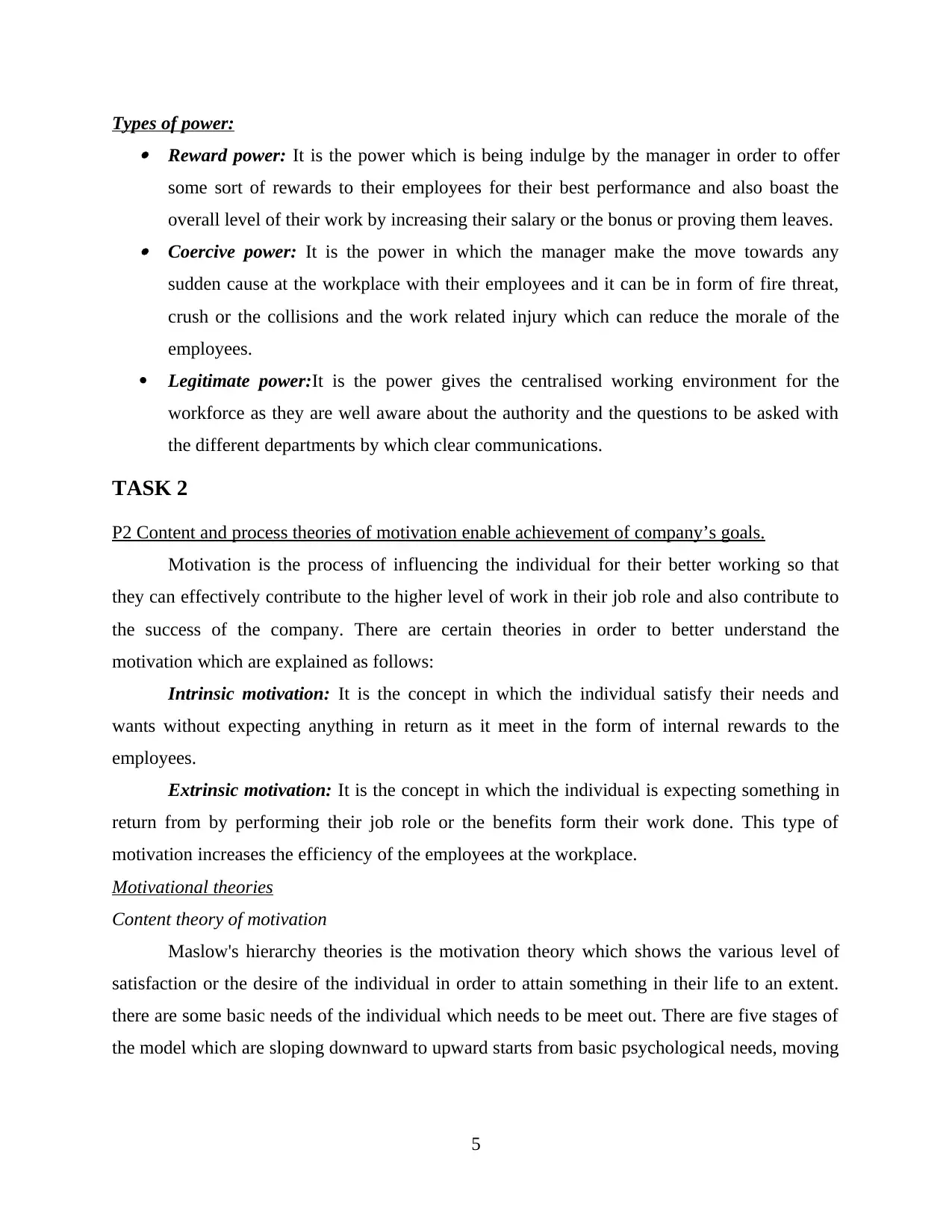
Types of power: Reward power: It is the power which is being indulge by the manager in order to offer
some sort of rewards to their employees for their best performance and also boast the
overall level of their work by increasing their salary or the bonus or proving them leaves. Coercive power: It is the power in which the manager make the move towards any
sudden cause at the workplace with their employees and it can be in form of fire threat,
crush or the collisions and the work related injury which can reduce the morale of the
employees.
Legitimate power:It is the power gives the centralised working environment for the
workforce as they are well aware about the authority and the questions to be asked with
the different departments by which clear communications.
TASK 2
P2 Content and process theories of motivation enable achievement of company’s goals.
Motivation is the process of influencing the individual for their better working so that
they can effectively contribute to the higher level of work in their job role and also contribute to
the success of the company. There are certain theories in order to better understand the
motivation which are explained as follows:
Intrinsic motivation: It is the concept in which the individual satisfy their needs and
wants without expecting anything in return as it meet in the form of internal rewards to the
employees.
Extrinsic motivation: It is the concept in which the individual is expecting something in
return from by performing their job role or the benefits form their work done. This type of
motivation increases the efficiency of the employees at the workplace.
Motivational theories
Content theory of motivation
Maslow's hierarchy theories is the motivation theory which shows the various level of
satisfaction or the desire of the individual in order to attain something in their life to an extent.
there are some basic needs of the individual which needs to be meet out. There are five stages of
the model which are sloping downward to upward starts from basic psychological needs, moving
5
some sort of rewards to their employees for their best performance and also boast the
overall level of their work by increasing their salary or the bonus or proving them leaves. Coercive power: It is the power in which the manager make the move towards any
sudden cause at the workplace with their employees and it can be in form of fire threat,
crush or the collisions and the work related injury which can reduce the morale of the
employees.
Legitimate power:It is the power gives the centralised working environment for the
workforce as they are well aware about the authority and the questions to be asked with
the different departments by which clear communications.
TASK 2
P2 Content and process theories of motivation enable achievement of company’s goals.
Motivation is the process of influencing the individual for their better working so that
they can effectively contribute to the higher level of work in their job role and also contribute to
the success of the company. There are certain theories in order to better understand the
motivation which are explained as follows:
Intrinsic motivation: It is the concept in which the individual satisfy their needs and
wants without expecting anything in return as it meet in the form of internal rewards to the
employees.
Extrinsic motivation: It is the concept in which the individual is expecting something in
return from by performing their job role or the benefits form their work done. This type of
motivation increases the efficiency of the employees at the workplace.
Motivational theories
Content theory of motivation
Maslow's hierarchy theories is the motivation theory which shows the various level of
satisfaction or the desire of the individual in order to attain something in their life to an extent.
there are some basic needs of the individual which needs to be meet out. There are five stages of
the model which are sloping downward to upward starts from basic psychological needs, moving
5
Paraphrase This Document
Need a fresh take? Get an instant paraphrase of this document with our AI Paraphraser
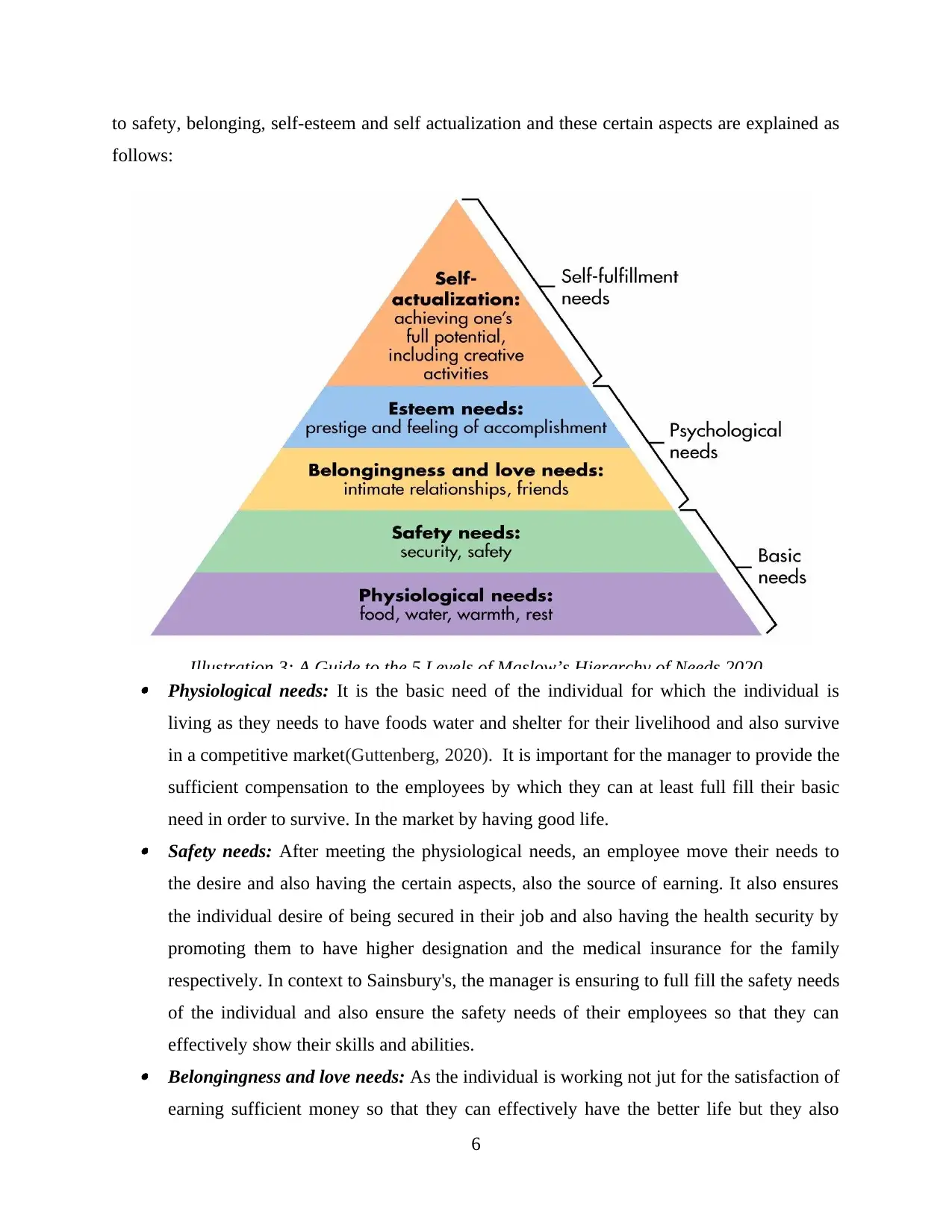
to safety, belonging, self-esteem and self actualization and these certain aspects are explained as
follows:
Illustration 3: A Guide to the 5 Levels of Maslow’s Hierarchy of Needs,2020
Physiological needs: It is the basic need of the individual for which the individual is
living as they needs to have foods water and shelter for their livelihood and also survive
in a competitive market(Guttenberg, 2020). It is important for the manager to provide the
sufficient compensation to the employees by which they can at least full fill their basic
need in order to survive. In the market by having good life. Safety needs: After meeting the physiological needs, an employee move their needs to
the desire and also having the certain aspects, also the source of earning. It also ensures
the individual desire of being secured in their job and also having the health security by
promoting them to have higher designation and the medical insurance for the family
respectively. In context to Sainsbury's, the manager is ensuring to full fill the safety needs
of the individual and also ensure the safety needs of their employees so that they can
effectively show their skills and abilities. Belongingness and love needs: As the individual is working not jut for the satisfaction of
earning sufficient money so that they can effectively have the better life but they also
6
follows:
Illustration 3: A Guide to the 5 Levels of Maslow’s Hierarchy of Needs,2020
Physiological needs: It is the basic need of the individual for which the individual is
living as they needs to have foods water and shelter for their livelihood and also survive
in a competitive market(Guttenberg, 2020). It is important for the manager to provide the
sufficient compensation to the employees by which they can at least full fill their basic
need in order to survive. In the market by having good life. Safety needs: After meeting the physiological needs, an employee move their needs to
the desire and also having the certain aspects, also the source of earning. It also ensures
the individual desire of being secured in their job and also having the health security by
promoting them to have higher designation and the medical insurance for the family
respectively. In context to Sainsbury's, the manager is ensuring to full fill the safety needs
of the individual and also ensure the safety needs of their employees so that they can
effectively show their skills and abilities. Belongingness and love needs: As the individual is working not jut for the satisfaction of
earning sufficient money so that they can effectively have the better life but they also
6
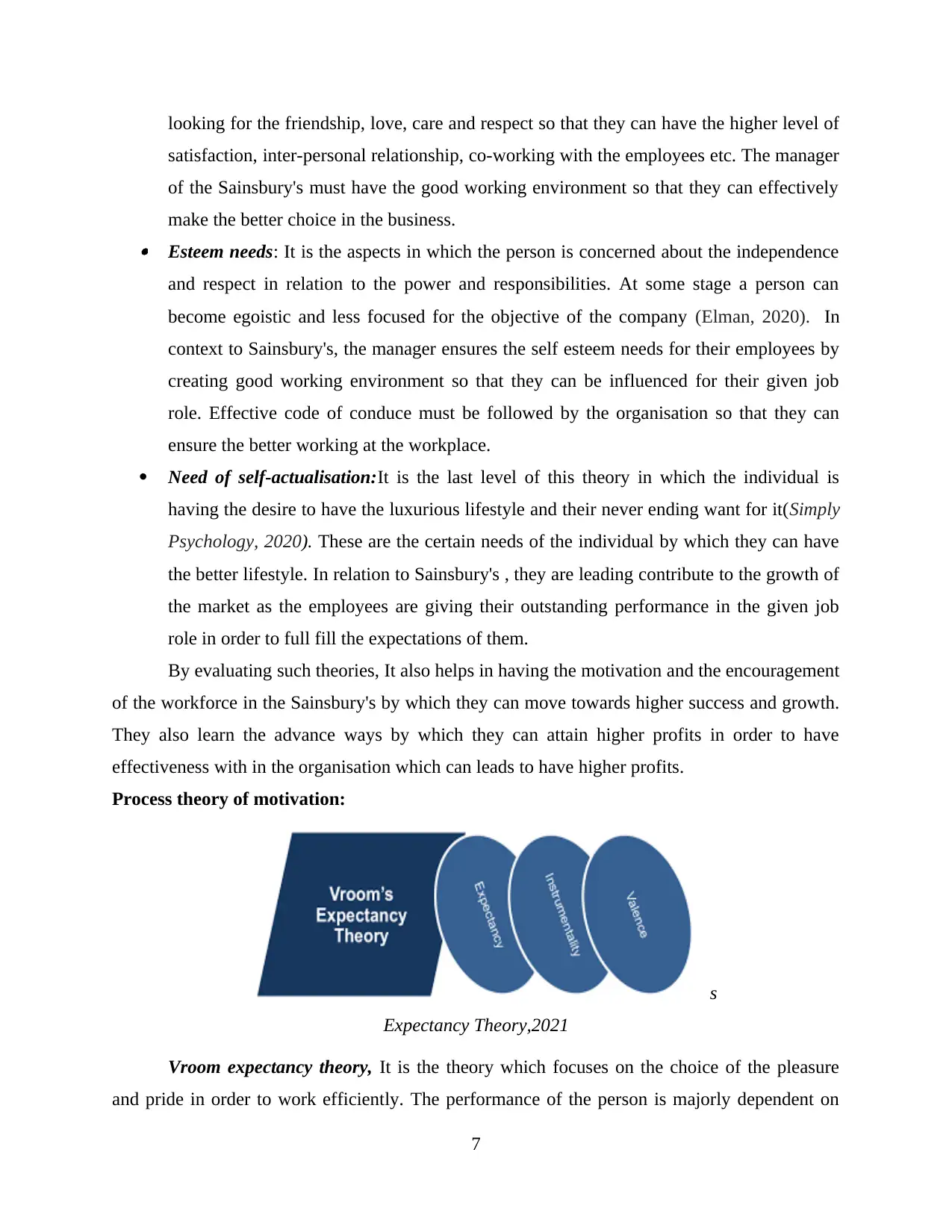
looking for the friendship, love, care and respect so that they can have the higher level of
satisfaction, inter-personal relationship, co-working with the employees etc. The manager
of the Sainsbury's must have the good working environment so that they can effectively
make the better choice in the business. Esteem needs: It is the aspects in which the person is concerned about the independence
and respect in relation to the power and responsibilities. At some stage a person can
become egoistic and less focused for the objective of the company (Elman, 2020). In
context to Sainsbury's, the manager ensures the self esteem needs for their employees by
creating good working environment so that they can be influenced for their given job
role. Effective code of conduce must be followed by the organisation so that they can
ensure the better working at the workplace.
Need of self-actualisation:It is the last level of this theory in which the individual is
having the desire to have the luxurious lifestyle and their never ending want for it(Simply
Psychology, 2020). These are the certain needs of the individual by which they can have
the better lifestyle. In relation to Sainsbury's , they are leading contribute to the growth of
the market as the employees are giving their outstanding performance in the given job
role in order to full fill the expectations of them.
By evaluating such theories, It also helps in having the motivation and the encouragement
of the workforce in the Sainsbury's by which they can move towards higher success and growth.
They also learn the advance ways by which they can attain higher profits in order to have
effectiveness with in the organisation which can leads to have higher profits.
Process theory of motivation:
s
Expectancy Theory,2021
Vroom expectancy theory, It is the theory which focuses on the choice of the pleasure
and pride in order to work efficiently. The performance of the person is majorly dependent on
7
satisfaction, inter-personal relationship, co-working with the employees etc. The manager
of the Sainsbury's must have the good working environment so that they can effectively
make the better choice in the business. Esteem needs: It is the aspects in which the person is concerned about the independence
and respect in relation to the power and responsibilities. At some stage a person can
become egoistic and less focused for the objective of the company (Elman, 2020). In
context to Sainsbury's, the manager ensures the self esteem needs for their employees by
creating good working environment so that they can be influenced for their given job
role. Effective code of conduce must be followed by the organisation so that they can
ensure the better working at the workplace.
Need of self-actualisation:It is the last level of this theory in which the individual is
having the desire to have the luxurious lifestyle and their never ending want for it(Simply
Psychology, 2020). These are the certain needs of the individual by which they can have
the better lifestyle. In relation to Sainsbury's , they are leading contribute to the growth of
the market as the employees are giving their outstanding performance in the given job
role in order to full fill the expectations of them.
By evaluating such theories, It also helps in having the motivation and the encouragement
of the workforce in the Sainsbury's by which they can move towards higher success and growth.
They also learn the advance ways by which they can attain higher profits in order to have
effectiveness with in the organisation which can leads to have higher profits.
Process theory of motivation:
s
Expectancy Theory,2021
Vroom expectancy theory, It is the theory which focuses on the choice of the pleasure
and pride in order to work efficiently. The performance of the person is majorly dependent on
7
⊘ This is a preview!⊘
Do you want full access?
Subscribe today to unlock all pages.

Trusted by 1+ million students worldwide
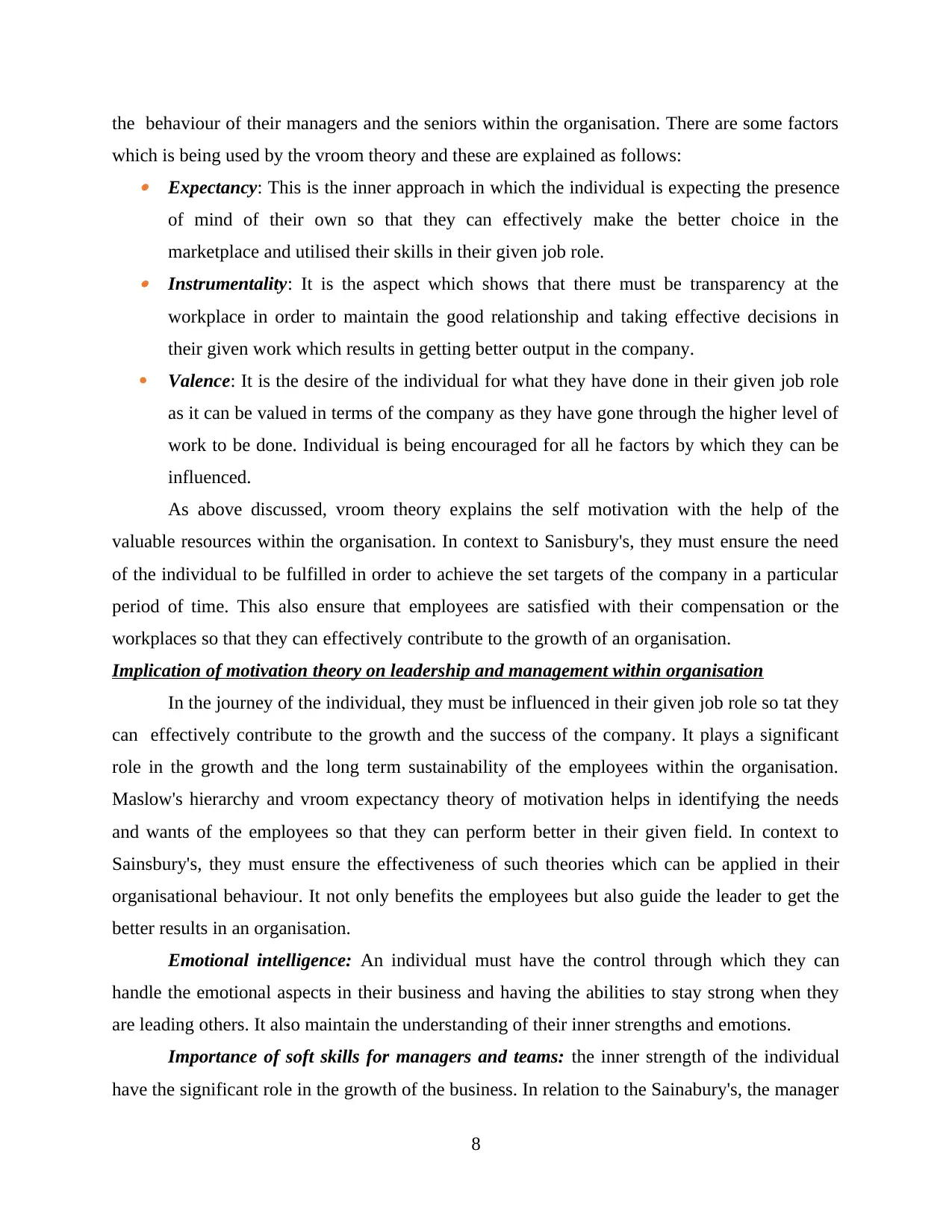
the behaviour of their managers and the seniors within the organisation. There are some factors
which is being used by the vroom theory and these are explained as follows: Expectancy: This is the inner approach in which the individual is expecting the presence
of mind of their own so that they can effectively make the better choice in the
marketplace and utilised their skills in their given job role. Instrumentality: It is the aspect which shows that there must be transparency at the
workplace in order to maintain the good relationship and taking effective decisions in
their given work which results in getting better output in the company.
Valence: It is the desire of the individual for what they have done in their given job role
as it can be valued in terms of the company as they have gone through the higher level of
work to be done. Individual is being encouraged for all he factors by which they can be
influenced.
As above discussed, vroom theory explains the self motivation with the help of the
valuable resources within the organisation. In context to Sanisbury's, they must ensure the need
of the individual to be fulfilled in order to achieve the set targets of the company in a particular
period of time. This also ensure that employees are satisfied with their compensation or the
workplaces so that they can effectively contribute to the growth of an organisation.
Implication of motivation theory on leadership and management within organisation
In the journey of the individual, they must be influenced in their given job role so tat they
can effectively contribute to the growth and the success of the company. It plays a significant
role in the growth and the long term sustainability of the employees within the organisation.
Maslow's hierarchy and vroom expectancy theory of motivation helps in identifying the needs
and wants of the employees so that they can perform better in their given field. In context to
Sainsbury's, they must ensure the effectiveness of such theories which can be applied in their
organisational behaviour. It not only benefits the employees but also guide the leader to get the
better results in an organisation.
Emotional intelligence: An individual must have the control through which they can
handle the emotional aspects in their business and having the abilities to stay strong when they
are leading others. It also maintain the understanding of their inner strengths and emotions.
Importance of soft skills for managers and teams: the inner strength of the individual
have the significant role in the growth of the business. In relation to the Sainabury's, the manager
8
which is being used by the vroom theory and these are explained as follows: Expectancy: This is the inner approach in which the individual is expecting the presence
of mind of their own so that they can effectively make the better choice in the
marketplace and utilised their skills in their given job role. Instrumentality: It is the aspect which shows that there must be transparency at the
workplace in order to maintain the good relationship and taking effective decisions in
their given work which results in getting better output in the company.
Valence: It is the desire of the individual for what they have done in their given job role
as it can be valued in terms of the company as they have gone through the higher level of
work to be done. Individual is being encouraged for all he factors by which they can be
influenced.
As above discussed, vroom theory explains the self motivation with the help of the
valuable resources within the organisation. In context to Sanisbury's, they must ensure the need
of the individual to be fulfilled in order to achieve the set targets of the company in a particular
period of time. This also ensure that employees are satisfied with their compensation or the
workplaces so that they can effectively contribute to the growth of an organisation.
Implication of motivation theory on leadership and management within organisation
In the journey of the individual, they must be influenced in their given job role so tat they
can effectively contribute to the growth and the success of the company. It plays a significant
role in the growth and the long term sustainability of the employees within the organisation.
Maslow's hierarchy and vroom expectancy theory of motivation helps in identifying the needs
and wants of the employees so that they can perform better in their given field. In context to
Sainsbury's, they must ensure the effectiveness of such theories which can be applied in their
organisational behaviour. It not only benefits the employees but also guide the leader to get the
better results in an organisation.
Emotional intelligence: An individual must have the control through which they can
handle the emotional aspects in their business and having the abilities to stay strong when they
are leading others. It also maintain the understanding of their inner strengths and emotions.
Importance of soft skills for managers and teams: the inner strength of the individual
have the significant role in the growth of the business. In relation to the Sainabury's, the manager
8
Paraphrase This Document
Need a fresh take? Get an instant paraphrase of this document with our AI Paraphraser
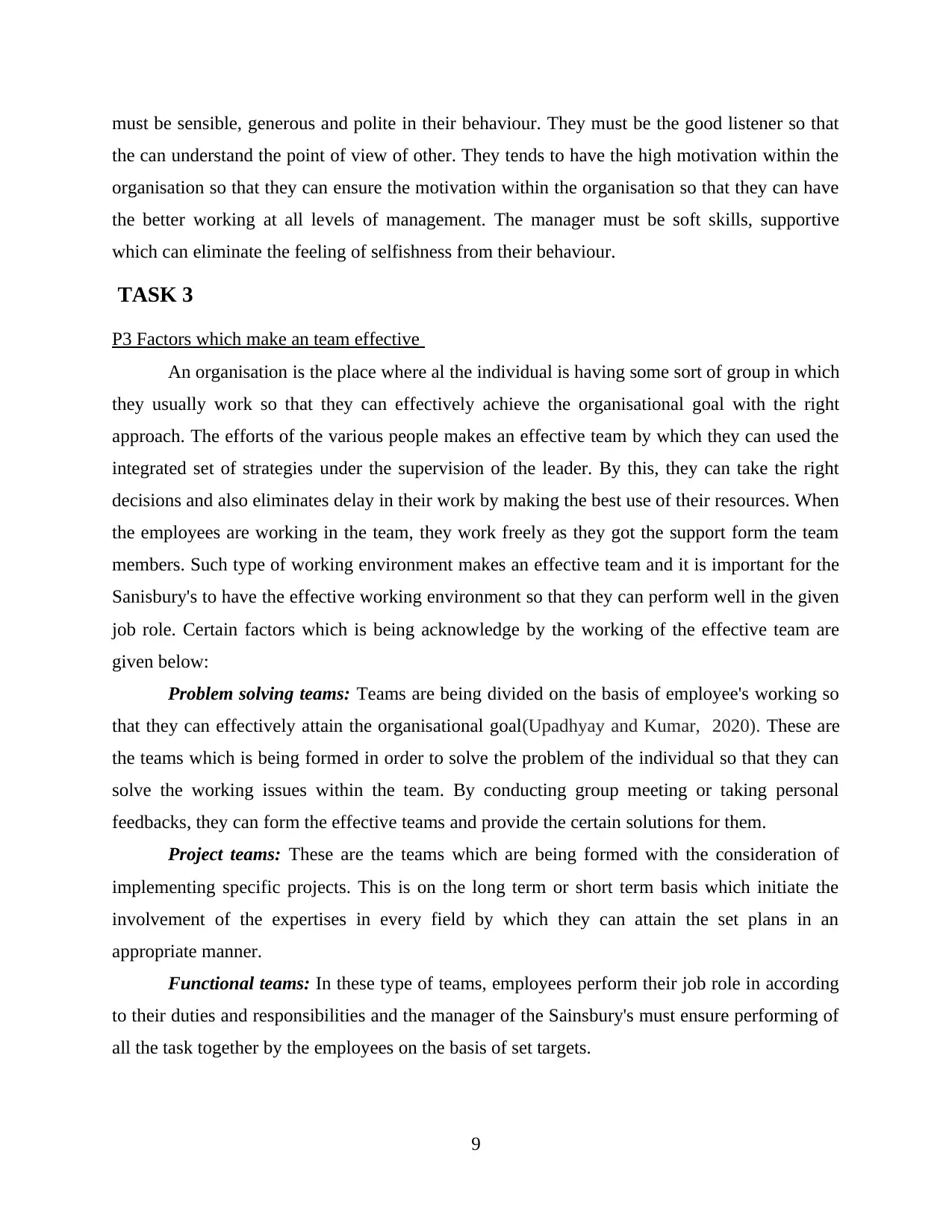
must be sensible, generous and polite in their behaviour. They must be the good listener so that
the can understand the point of view of other. They tends to have the high motivation within the
organisation so that they can ensure the motivation within the organisation so that they can have
the better working at all levels of management. The manager must be soft skills, supportive
which can eliminate the feeling of selfishness from their behaviour.
TASK 3
P3 Factors which make an team effective
An organisation is the place where al the individual is having some sort of group in which
they usually work so that they can effectively achieve the organisational goal with the right
approach. The efforts of the various people makes an effective team by which they can used the
integrated set of strategies under the supervision of the leader. By this, they can take the right
decisions and also eliminates delay in their work by making the best use of their resources. When
the employees are working in the team, they work freely as they got the support form the team
members. Such type of working environment makes an effective team and it is important for the
Sanisbury's to have the effective working environment so that they can perform well in the given
job role. Certain factors which is being acknowledge by the working of the effective team are
given below:
Problem solving teams: Teams are being divided on the basis of employee's working so
that they can effectively attain the organisational goal(Upadhyay and Kumar, 2020). These are
the teams which is being formed in order to solve the problem of the individual so that they can
solve the working issues within the team. By conducting group meeting or taking personal
feedbacks, they can form the effective teams and provide the certain solutions for them.
Project teams: These are the teams which are being formed with the consideration of
implementing specific projects. This is on the long term or short term basis which initiate the
involvement of the expertises in every field by which they can attain the set plans in an
appropriate manner.
Functional teams: In these type of teams, employees perform their job role in according
to their duties and responsibilities and the manager of the Sainsbury's must ensure performing of
all the task together by the employees on the basis of set targets.
9
the can understand the point of view of other. They tends to have the high motivation within the
organisation so that they can ensure the motivation within the organisation so that they can have
the better working at all levels of management. The manager must be soft skills, supportive
which can eliminate the feeling of selfishness from their behaviour.
TASK 3
P3 Factors which make an team effective
An organisation is the place where al the individual is having some sort of group in which
they usually work so that they can effectively achieve the organisational goal with the right
approach. The efforts of the various people makes an effective team by which they can used the
integrated set of strategies under the supervision of the leader. By this, they can take the right
decisions and also eliminates delay in their work by making the best use of their resources. When
the employees are working in the team, they work freely as they got the support form the team
members. Such type of working environment makes an effective team and it is important for the
Sanisbury's to have the effective working environment so that they can perform well in the given
job role. Certain factors which is being acknowledge by the working of the effective team are
given below:
Problem solving teams: Teams are being divided on the basis of employee's working so
that they can effectively attain the organisational goal(Upadhyay and Kumar, 2020). These are
the teams which is being formed in order to solve the problem of the individual so that they can
solve the working issues within the team. By conducting group meeting or taking personal
feedbacks, they can form the effective teams and provide the certain solutions for them.
Project teams: These are the teams which are being formed with the consideration of
implementing specific projects. This is on the long term or short term basis which initiate the
involvement of the expertises in every field by which they can attain the set plans in an
appropriate manner.
Functional teams: In these type of teams, employees perform their job role in according
to their duties and responsibilities and the manager of the Sainsbury's must ensure performing of
all the task together by the employees on the basis of set targets.
9
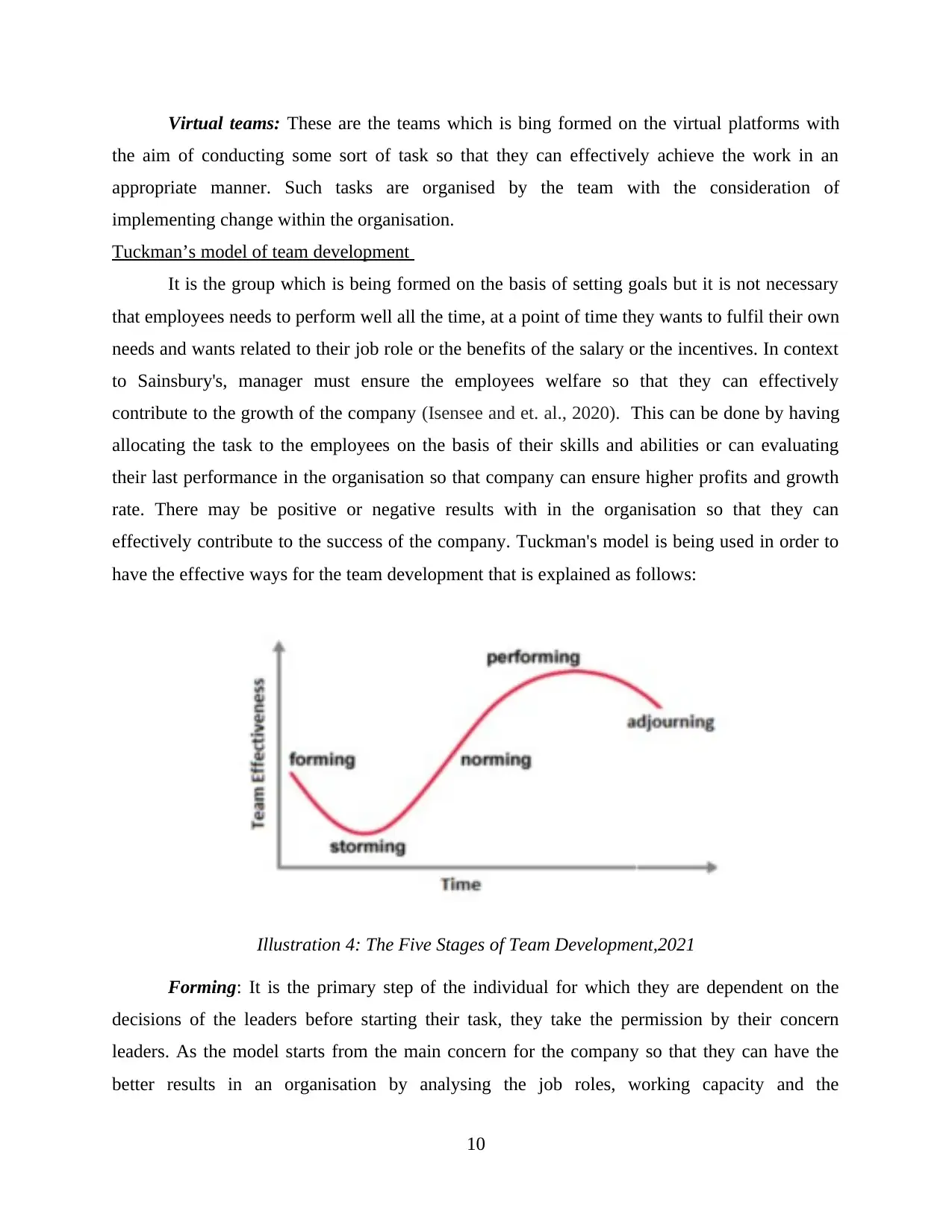
Virtual teams: These are the teams which is bing formed on the virtual platforms with
the aim of conducting some sort of task so that they can effectively achieve the work in an
appropriate manner. Such tasks are organised by the team with the consideration of
implementing change within the organisation.
Tuckman’s model of team development
It is the group which is being formed on the basis of setting goals but it is not necessary
that employees needs to perform well all the time, at a point of time they wants to fulfil their own
needs and wants related to their job role or the benefits of the salary or the incentives. In context
to Sainsbury's, manager must ensure the employees welfare so that they can effectively
contribute to the growth of the company (Isensee and et. al., 2020). This can be done by having
allocating the task to the employees on the basis of their skills and abilities or can evaluating
their last performance in the organisation so that company can ensure higher profits and growth
rate. There may be positive or negative results with in the organisation so that they can
effectively contribute to the success of the company. Tuckman's model is being used in order to
have the effective ways for the team development that is explained as follows:
Illustration 4: The Five Stages of Team Development,2021
Forming: It is the primary step of the individual for which they are dependent on the
decisions of the leaders before starting their task, they take the permission by their concern
leaders. As the model starts from the main concern for the company so that they can have the
better results in an organisation by analysing the job roles, working capacity and the
10
the aim of conducting some sort of task so that they can effectively achieve the work in an
appropriate manner. Such tasks are organised by the team with the consideration of
implementing change within the organisation.
Tuckman’s model of team development
It is the group which is being formed on the basis of setting goals but it is not necessary
that employees needs to perform well all the time, at a point of time they wants to fulfil their own
needs and wants related to their job role or the benefits of the salary or the incentives. In context
to Sainsbury's, manager must ensure the employees welfare so that they can effectively
contribute to the growth of the company (Isensee and et. al., 2020). This can be done by having
allocating the task to the employees on the basis of their skills and abilities or can evaluating
their last performance in the organisation so that company can ensure higher profits and growth
rate. There may be positive or negative results with in the organisation so that they can
effectively contribute to the success of the company. Tuckman's model is being used in order to
have the effective ways for the team development that is explained as follows:
Illustration 4: The Five Stages of Team Development,2021
Forming: It is the primary step of the individual for which they are dependent on the
decisions of the leaders before starting their task, they take the permission by their concern
leaders. As the model starts from the main concern for the company so that they can have the
better results in an organisation by analysing the job roles, working capacity and the
10
⊘ This is a preview!⊘
Do you want full access?
Subscribe today to unlock all pages.

Trusted by 1+ million students worldwide
1 out of 18
Related Documents
Your All-in-One AI-Powered Toolkit for Academic Success.
+13062052269
info@desklib.com
Available 24*7 on WhatsApp / Email
![[object Object]](/_next/static/media/star-bottom.7253800d.svg)
Unlock your academic potential
Copyright © 2020–2026 A2Z Services. All Rights Reserved. Developed and managed by ZUCOL.




